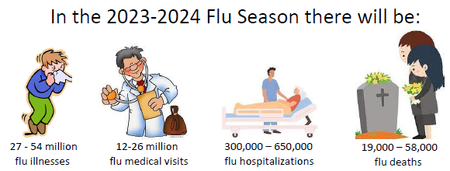
Who Needs a Flu Shot?
Influenza, commonly called "the flu," is an infection of the
respiratory tract caused by the influenza virus. Compared with most
viral respiratory infections, such as the common cold, influenza
infection often causes a more severe illness. Typical influenza illness
includes fever (usually 100 degrees F to 103 degrees F in adults and
often even higher in children) and respiratory symptoms, such as cough,
sore throat, runny or stuffy nose, as well as headache, muscle aches and
extreme fatigue. Although nausea, vomiting and diarrhea can sometimes
accompany influenza infection, especially in children, these symptoms
are rarely the primary symptoms. The term "stomach flu" is a misnomer
that is sometimes used to describe gastrointestinal illnesses caused by
organisms other than influenza viruses.

The best way to prevent flu is by getting vaccinated each year.
"No one likes getting a shot, no matter how old you are, but it's important to reduce the spread of the flu," said Kane County Board Chairman Corinne Pierog. "Even if you don't think you need a flu shot, you can be a 'flu fighter' by getting it and potentially protect the people you love and are close to you who maybe more susceptible to the flu."
Everyone 6 months of age and older should get a flu vaccine every
season. Flu vaccine is provided at many local health departments,
private health care providers, and pharmacies across Illinois. It is
recommended you contact your health care provider about what form of flu
vaccine you should receive.
Most people who get the flu recover completely in 1 to 2 weeks, but some
people develop serious and potentially life-threatening medical
complications, such as pneumonia. Over the past decade, influenza and
pneumonia have been associated with an average of 3,500 deaths a year in
Illinois. Since 1992, the highest number of flu and pneumonia deaths
was the 4,021 recorded in 1993. Flu-related complications can occur at
any age, but the elderly and people with chronic health problems are
much more likely to develop serious complications after influenza
infection than are young, healthier people. During most flu seasons,
which typically run from October through May, between 10 percent and 20
percent of the population is infected with influenza viruses. More than
200,000 people are hospitalized from flu complications each year in the
U.S.
Do I Have the Flu?
The flu is a contagious respiratory illness caused by influenza
viruses. It can cause mild to severe illness, and at times can lead to
death.
Symptoms of flu include:
- fever (usually high)
- headache
- extreme tiredness
- dry cough
- sore throat
- runny or stuffy nose
- muscle aches
- Stomach symptoms, such as nausea, vomiting, and diarrhea, also can occur but are more common in children than adults.
While getting a flu vaccine each year is the best way to protect against flu, influenza antiviral drugs can fight against influenza, offering a second line of defense against the flu.
If You Get Sick
Most healthy people recover from the flu without complications. If you get the flu:
- Stay home from work or school.
- Get lots of rest, drink plenty of liquids, and avoid using alcohol and tobacco.
- There are over-the-counter (OTC) medications to relieve the symptoms of the flu (but never give aspirin to children or teenagers who have flu-like symptoms, particularly fever).
- Remember that serious illness from the flu is more likely in certain groups of people including people 65 years of age and older, pregnant women, people with certain chronic medical conditions and young children.
- Consult your doctor early on for the best treatment, but also be
aware of emergency warning signs that require urgent medical attention.

